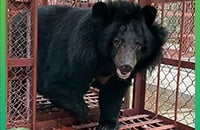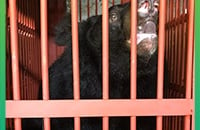Synthetic bile plan could end demand for bear bile
31 July 2014
Animals Asia has welcomed news that China’s largest bear bile pharmaceutical company is now pursuing research on synthetic alternatives.
KaiBao Pharmaceutical is a cornerstone of the bear bile industry. In 2012 it bought 18 tonnes of bear bile powder for use in Traditional Chinese Medicine (TCM) and continues to be the major outlet for industrial bear bile farms.
The company’s project “Key Technology and Clinical Research of Developing Bear Bile Powder in Vitro” has gained support from the State Ministry of Science and Technology in its five-year plan entitled: “Key Technology and Clinical Research of Developing Bear Bile Powder”.
KaiBao states:
“The project aims to develop a synthetic bear bile bioequivalent in terms of chemical composition by using poultry bile and biotransformation technology and gaining the independent intellectual property rights. The project will benefit the protection and sustainable using of endangered medicinal animal resources and provide raw materials with stable and controllable quality for developing new drugs and bear bile powder products. These are of great significance for the history and development of traditional Chinese medicine.”
This groundbreaking research will be significant in demonstrating alternative thinking within the traditional Chinese medicine industry and its use of wild animal body parts as medicinal raw materials.
The advent and promotion of synthetic alternatives will benefit both animals and the Chinese medicine industry and ease public concern regarding the ethical use of threatened species within Chinese pharmacopoeia.
Animals Asia founder Jill Robinson said:
“We welcome this decision and are in support of such measures that will replace bear bile with a synthetic alternative. Such a step forward is good news for the pharmaceuticals, for those who practice TCM, and for customers too. We applaud the official backing of this research and believe it is good news for the bears and the millions of people who have campaigned for their freedom.”
Animals Asia has a sanctuary in Chengdu, China and Tam Dao, Vietnam. It also recently announced the conversion to a sanctuary of a bear bile farm in Nanning housing 130 bears. Dubbed the Peace by Piece rescue – the aim was to show that as demand for bear bile decreases – the farmers and their bears can be part of a solution based strategy to end bear bile farming once and for all.
Including the Nanning project, Animals Asia has rescued over 500 bears, mainly moon bears, from the bear bile industry.
NOTE: We note that synthetic bear bile is also still an animal product – albeit a byproduct of a wider industry. It remains an ethical dilemma and the debate surrounding the use of all animal products continues and remains entirely worthwhile. From the point of view of ending bear bile farming, and drastically reducing suffering of animals caged and mutilated for anything up to 30 years of their lives, this is a huge step. In the meantime, the battle to improve the lives of all animals, including those suffering under intensive farming conditions, goes on.
BACK




 Freedom after two decades: Moon bears Nang and Mua rescued
Freedom after two decades: Moon bears Nang and Mua rescued
 With heavy hearts we say goodbye to our beloved Tulip
With heavy hearts we say goodbye to our beloved Tulip
 Three moon bears rescued from notorious bear bile farming hotspots in Vietnam
Three moon bears rescued from notorious bear bile farming hotspots in Vietnam
